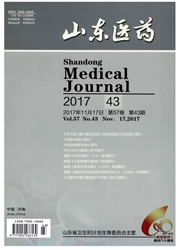

 中文摘要:
中文摘要:
目的研究热化疗对肺部肿瘤细胞生长的影响及其可能的机制。方法采用43℃加热联合120μg/L紫杉醇(热化联合组)、43℃加热联合120μg/L紫杉醇及20μmol/L JNK特异抑制剂SP600125(SP600125组)、单纯使用120μg/L紫杉醇(单纯化疗组)处理H446细胞,以未处理的H446细胞作对照;采用噻唑兰比色法检测各组细胞增殖率,RT-PCR检测有丝分裂素激活蛋白激酶激酶4(MKK4)表达,Western blotting法检测JNK磷酸化水平。结果热化联合组细胞增殖率低于其余各组(P〈0.05);热化联合组MKK4表达高于对照组和单纯化疗组(P〈0.05),JNK磷酸化水平在热化联合组中表达明显增高(P〈0.05),SP600125可抑制其磷酸化(P〈0.05)。结论热化疗联合应用可以明显抑制H446细胞的生长,这种抑制作用可能是通过激活JNK信号转导通路实现的。
 英文摘要:
英文摘要:
Objective To study the effect of thermo-ehemotherapy on lung cancer and its possible mechanism. Meth ods H446 cells were subjected to different thermo-chemotherapy strategies: 43 ℃ + Paclitaxel ( 120 μg/L) ( thermo- chemotherapy group), 43 ℃ + Paclitaxel (120 μg/L) + SP600125 (20 μmol/L, JNK inhibitor) (SP600125 group), and Paclitaxel ( 120 p.g/L) group; untreated cells served as control. MTT assay was used to measure cell proliferation, Westerm blotting was used to examine the phosphorylation of JNK. Results The proliferation rate of ceils in the thermo-chemotherapy group was significandy lower than that in the other groups ( all P 〈 0.05 ). Compared with the other groups , the thermo- chemotherapy group showed the expression of MKK4 and the phosphorylation of JNK significantly increased (all P 〈 0.05 ), SP600125 inhibited the phosphorylation of JNK. Conclusions Thermotherapy can promote the inhibitory effect of paclitaxel chemotherapy against the growth of lung cancer cell line H446, probably through activating JNK pathway.
 同期刊论文项目
同期刊论文项目
 同项目期刊论文
同项目期刊论文
 期刊信息
期刊信息
